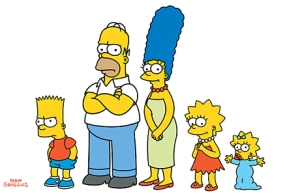In 1989, the world was introduced to a sitcom that would become the go-to image of the “American Family” for decades to come. The Simpsons, with it’s 500+ episodes, is the longest running sitcom in America, which means it has unintentionally and intentionally played into stereotypes for a long, long time. The Simpsons features a dialogue that simultaneously makes the viewers the victims and the audience of the plot. Basically, the viewer will be caught laughing at drunken, fat, naive, Homer, while perhaps they, themselves, are who the writer is making fun of! Such is the brilliance of the show. The audience of the show can feel entertained, the animation lending to escapism, but the topics and characters are extremely familiar. But that “familiarity” is what leads to the rampant stereotypes in The Simpsons. That being said, there are far too many stereotypes to analyze the entire show so, the Simpsons family will be the center of focus.
Homer: Homer is a husband, a father, a blue collar worker, and most memorably, a drunk. The audience is hard pressed to find an episode where Homer doesn’t sit in Moe’s Tavern and nurse a pint. Homer is a stereotype of the Modern Middle Class Man. It’s all well and good until you look past that cute naiveté. Homer is unintelligent and a man-child. He is never expected to be responsible and is constantly letting someone down. This image perpetuates an example of accepted laziness within America. The Simpsons is a global phenomenon and when viewers across the sea witness Homer’s antics they make shake their heads and mutter, “Americans”. D’oh.
Marge: Marge is a wife, a mother, and a…..?? There really isn’t much else to the character of “Marge”, and that’s the problem. She is a stereotype of Traditional Female Roles. Marge is the June Clever of the animated world and her two-dimensions don’t make her any less harmful! Every now and then, the writers give Marge a fleeting career but it’s always brief. Being that Marge is the most grounded and mature person in the household one would think she could keep a job longer than her husband but it is not so. Gender role stereotypes at their finest. It is clear that Marge’s place is in the home. Who else would be able to roll the drunk husband and young children into bed?
Lisa: Lisa is a daughter, a sister, a saxophonist, and an excellent student. She is the beacon of hope for The Simpson family (and show!). Lisa challenges social norms and is only eight years old. But, while pushing against stereotypes within her world, Lisa falls into other stereotypes as a fictional character. Lisa is The Brains. What’s so bad about that? Well, Lisa is not always likable. In fact, she can be utterly abrasive. It’s as if to say, intelligence is annoying. She has few friends within the series and is always the butt of her brother’s jokes and pranks. What Lisa has in book smarts, she sometimes lacks in street smarts, which is the pervasive stereotype of scholarly individuals. The two-dimensional realm of Springfield does not embrace Lisa. So, she is also The Outcast. Now, Lisa is obnoxious and ostracized because she is smart. No matter what dimension, this is a harmful stereotype to highlight!
Bart: Bart is a son, a brother, and the class/town prankster. If Bart had all five fingers and wasn’t yellow he may have been a class-mate of yours. Is that because he is extremely stereotyped or is it because he is constantly emulated? Maybe both, which is what makes his character dangerous. Bart is The All-American Boy. The famous opening credits of The Simpsons features Bart in detention, writing a new phrase on the chalk board with each episode. So, before the show even starts the viewer is reminded that Bart is a trouble maker. But all is forgiven. Why? Because he’s so cool, and “just a boy!” If Lisa did half the things Bart does she would be serving harder time than writing on a chalk board, that’s for sure. Is that because she is a girl? Definitely. Once again the gender stereotypes are prevalent in The Simpsons. Bart gets to be a clown and loved, while his sister is the misunderstood loner.
Maggie: Maggie is a baby. Let’s not split hairs here.
Additionally: Apu… the Kwik-E-mart clerk… Come on!
WATCH A CLIP:
Disclaimer: This is one of my favorite shows. Of all time. But some things can’t be denied!
References:
http://simpsons.wikia.com/wiki/Simpsons_Wiki
my brain… dot com? 🙂



I completely agree with the analysis of Lisa’s treatment as a character versus Bart’s treatment as a character. In elementary and middle school (and unfortunately sometimes even in higher education), it seems like the girls who excel in academics are never very popular or well treated by their peers. They certainly aren’t considered “cool”. On the other hand when boys go out of their way to do something to make themselves seem dumb for a laugh….well, they get the laugh- every time! Where a girl would just be called stupid for doing something dumb, a boy is called funny or clever. The stereotypical Simpson children definitely hint at real gender stereotyping that still persists in “real life”.
Jessica,
At least Lisa is part of the story… Imagine if The Simpsons just featured Bart, a rebellious prankster, and Maggie, a little girl with a pacifier in her mouth! The symbolism is too much for me to handle! So, thank you, Lisa Simpson. 🙂
Excellent analysis! If the (not-so-subliminal) stereotyping is part of what makes this show funny, I guess the joke’s on us!
Amy,
After really analyzing the topic, don’t you think you’ll view 2D animation differently? I still find enjoyment out of it, and I hope you do too, but it definitely makes you think. Don’t just accept what the media delivers you as truth.